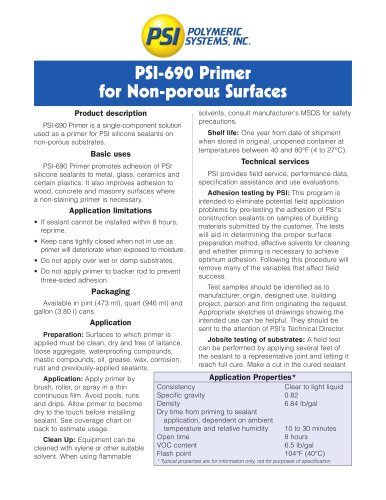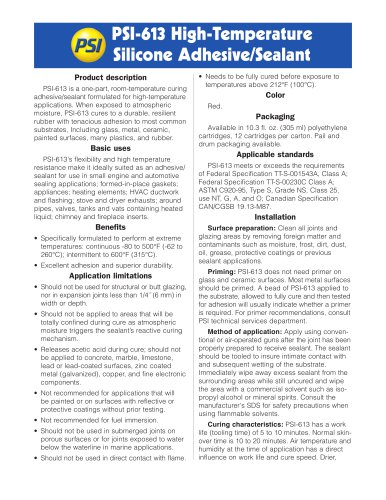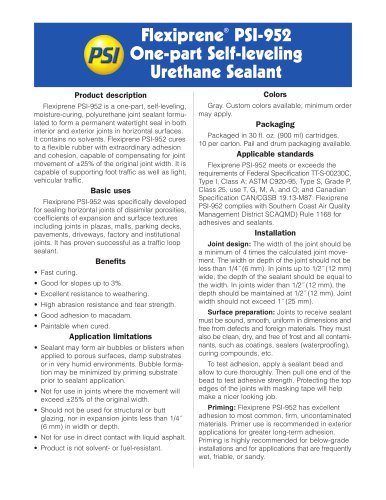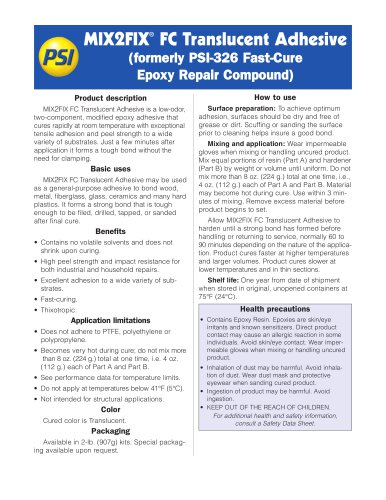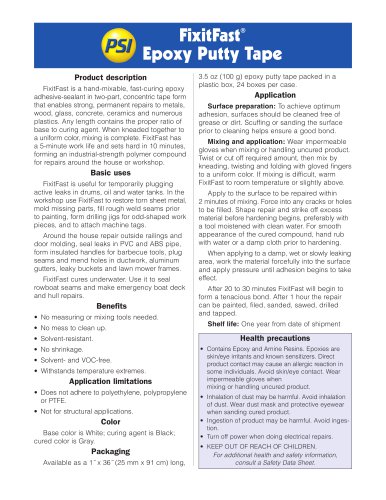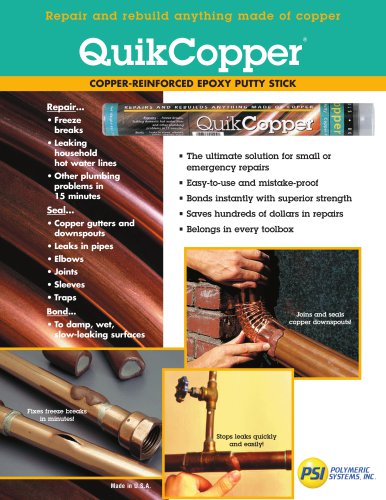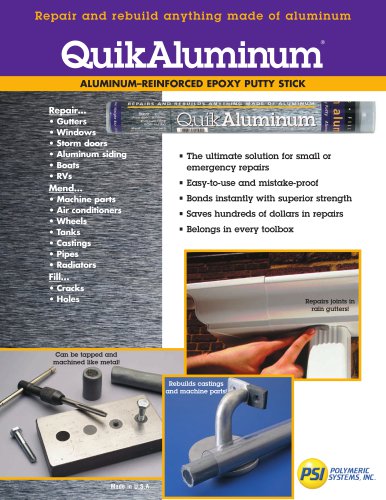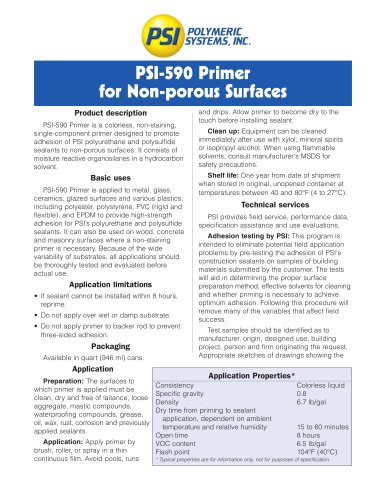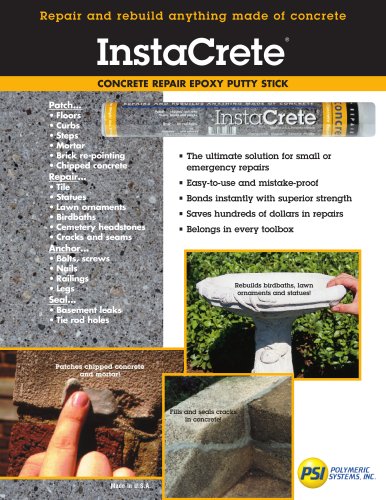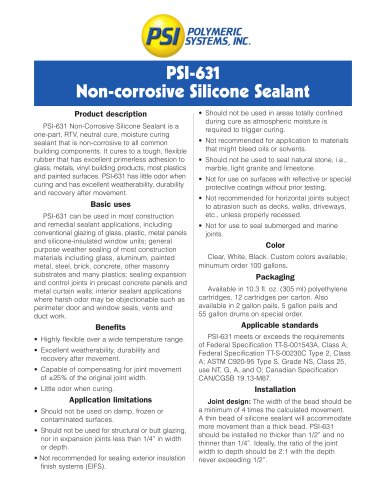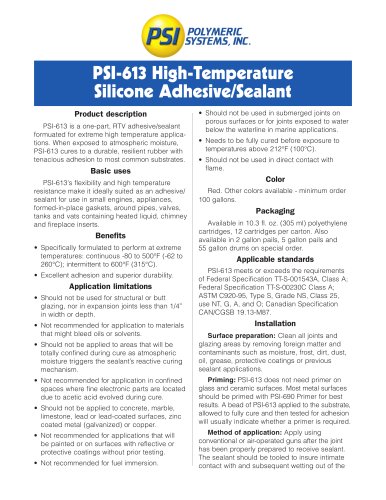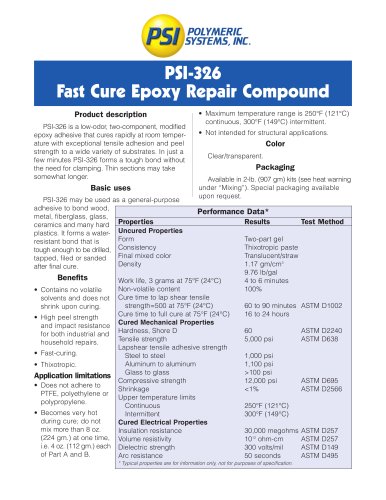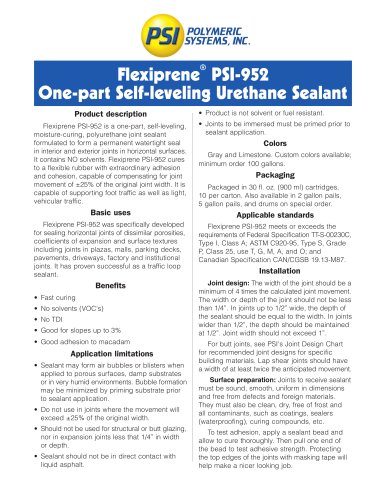
Catalog excerpts

PSI-690 Primer for Non-porous Surfaces Product description PSI-690 Primer is a single-component solution used as a primer for PSI silicone sealants on non-porous substrates. Basic uses PSI-690 Primer promotes adhesion of PSI silicone sealants to metal, glass, ceramics and certain plastics. It also improves adhesion to wood, concrete and masonry surfaces where a non-staining primer is necessary. Application limitations • If sealant cannot be installed within 8 hours, reprime. • Keep cans tightly closed when not in use as primer will deteriorate when exposed to moisture. • Do not apply over wet or damp substrates. • Do not apply primer to backer rod to prevent three-sided adhesion. Packaging Available in pint (473 ml), quart (946 ml) and gallon (3.80 l) cans. Application Preparation: Surfaces to which primer is applied must be clean, dry and free of laitance, loose aggregate, waterproofing compounds, mastic compounds, oil, grease, wax, corrosion, rust and previously-applied sealants. Application: Apply primer by brush, roller, or spray in a thin continuous film. Avoid pools, runs and drips. Allow primer to become dry to the touch before installing sealant. See coverage chart on back to estimate usage. Clean Up: Equipment can be cleaned with xylene or other suitable solvent. When using flammable solvents, consult manufacturer's MSDS for safety precautions. Shelf life: One year from date of shipment when stored in original, unopened container at temperatures between 40 and 80°F (4 to 27°C). Technical services PSI provides field service, performance data, specification assistance and use evaluations. Adhesion testing by PSI: This program is intended to eliminate potential field application problems by pre-testing the adhesion of PSI's construction sealants on samples of building materials submitted by the customer. The tests will aid in determining the proper surface preparation method, effective solvents for cleaning and whether priming is necessary to achieve optimum adhesion. Following this procedure will remove many of the variables that affect field success. Test samples should be identified as to manufacturer, origin, designed use, building project, person and firm originating the request. Appropriate sketches of drawings showing the intended use can be helpful. They should be sent to the attention of PSI's Technical Director. Jobsite testing of substrates: A field test can be performed by applying several feet of the sealant to a representative joint and letting it reach full cure. Make a cut in the cured sealant Application Properties* Consistency Specific gravity Density Dry time from priming to sealant application, dependent on ambient temperature and relative humidity Open time VOC content Flash point Clear to light liquid 0.82 6.84 lb/gal 10 to 30 minutes 8 hours 6.5 lb/gal 104°F (40°C) * Typical properties are for information only, not for purposes of specification.
Open the catalog to page 1
across the joint the entire depth of the sealant. Make two vertical cuts several inches long, paralleling the sides of the joint as closely as possible and extending down from the cross cut. Grasp the free length of sealant and pull at a 90° angle to determine if a good bond has developed. With good adhesion, the sealant will usually tear cohesively or be difficult to remove Polymeric Systems, Inc., is a part of Whitford Worldwide. For more information, please contact Polymeric Systems or Whitford Plastics Ltd. at: Email: sales@polymericsystems.com Website: polymericsystems.com 10....
Open the catalog to page 2All Polymeric Systems catalogs and brochures
-
PSI-613
3 Pages
-
PSI-601
3 Pages
-
Flexiprene® 1000
3 Pages
-
Flexiprene® PSI-952
3 Pages
-
PSI-275
4 Pages
-
MIX2FIX® FC
2 Pages
-
MIX2FIX®
2 Pages
-
Kneadatite®
2 Pages
-
RepairitQuik®
2 Pages
-
FixitFast ®
2 Pages
-
AquaMend
2 Pages
-
QuikWood
2 Pages
-
QuikCopper
2 Pages
-
QuikAluminum
2 Pages
-
FastSteel
2 Pages
-
QuikPlastik(4023-0908)
2 Pages
-
PSI-691TDS(7007-EM07)
2 Pages
-
PSI-591TDS(1005-EM07)
2 Pages
-
PSI-590TDS(1004-EM07)
2 Pages
-
InstaCrete(4020-0908)
2 Pages
Archived catalogs
-
PSI-641TDS(7005-0808)
3 Pages
-
PSI-631TDS(7003-EM07)
3 Pages
-
PSI-613TDS(7002-EM07)
3 Pages
-
PSI-601TDS(7000-0808)
3 Pages
-
PSI-326 TDS(2008-1009)
2 Pages
-
PSI-75 Primer (1023-0510)
2 Pages
-
Primer67TDS(1010-EM07)
2 Pages
-
Flex1000TDS(1015-EM07)
3 Pages
-
Flex952TDS(1020-EM07)
3 Pages

